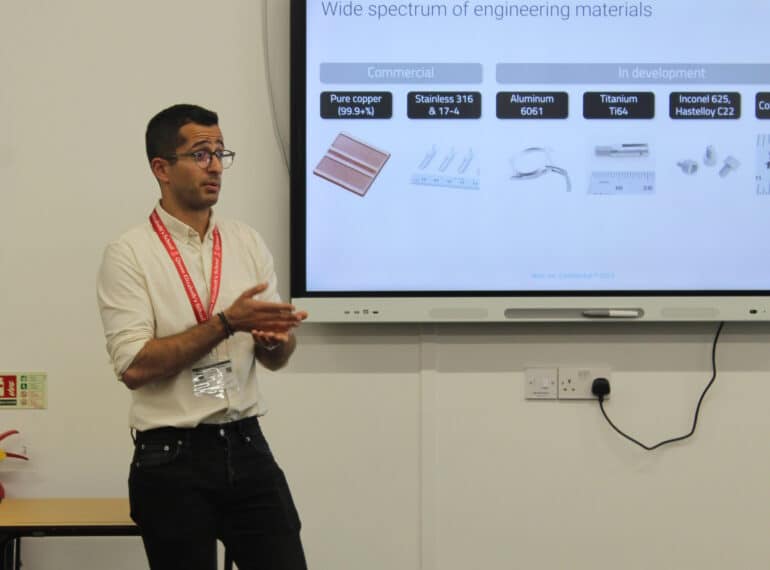
3D printing entrepreneur Arian Aghababaie, co-founder of California-based Holo, shared insights into the latest developments in additive manufacturing and gave advice on engineering careers when he led two inspirational events at QE during a visit to the UK.
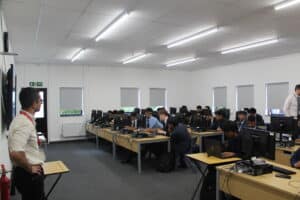 After working for global software firm Autodesk, based in San Francisco, Arian (OE 1998–2003) raised venture capital and successfully spun out its additive manufacturing team to form Holo, while also transitioning its technology from the 3D printing of polymers to metals. Six-and-a-half years later, Holo is at the forefront of innovation, using its proprietary digital platform to enable the manufacturing at scale of high-performance parts across a range of materials, including metals, ceramics and composites. Holo is supported by top-tier Silicon Valley investors and strategic partners.
After working for global software firm Autodesk, based in San Francisco, Arian (OE 1998–2003) raised venture capital and successfully spun out its additive manufacturing team to form Holo, while also transitioning its technology from the 3D printing of polymers to metals. Six-and-a-half years later, Holo is at the forefront of innovation, using its proprietary digital platform to enable the manufacturing at scale of high-performance parts across a range of materials, including metals, ceramics and composites. Holo is supported by top-tier Silicon Valley investors and strategic partners.
Arian’s morning at QE began with a tour of the School, before he led a Sixth Form additive manufacturing workshop, with five of QE’s own 3D printers on hand. Later, he delivered a lunchtime talk, giving his take on careers in engineering and 3D printing.
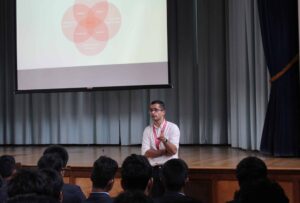 Head of Technology Michael Noonan said: “Arian provided Year 12 with a workshop which firstly covered his professional journey to date, from his early days post PhD working on founding his own company (The Invention Works) through to his position as Senior Principal Engineer at Autodesk. Most of the workshop, however, focussed on his current company, Holo. He explained that he and the other co-founders could see the enormous potential to create a viable business in this area and so pursued it as an opportunity.”
Head of Technology Michael Noonan said: “Arian provided Year 12 with a workshop which firstly covered his professional journey to date, from his early days post PhD working on founding his own company (The Invention Works) through to his position as Senior Principal Engineer at Autodesk. Most of the workshop, however, focussed on his current company, Holo. He explained that he and the other co-founders could see the enormous potential to create a viable business in this area and so pursued it as an opportunity.”
Arian went on to explain the details around the scale of production, the materials used and the fidelity of the products which Holo’s machines can make through its own PureForm Technology.
“His technologies have a unique advantage over competitors, and he works with many major companies in the healthcare, consumer electronics, robotics, and automotive sectors, to name a few,” said Mr Noonan.
He even set the Year 12 boys a challenge to develop a product using QE’s own 3D printers. They should design (and perhaps build) a scaled-up, minimally invasive surgical instrument. His requirements were that:
 The instrument should have six degrees of freedom
The instrument should have six degrees of freedom- It should be able to be cable or gear-driven
- The boys’ work should include the design of at least two custom end-effectors (the devices at the end of a robotic arm, designed to interact with the environment)
- They should determine its size and features based on the capabilities of their own printers.
Bonus points were offered for the designs with the fewest components and if the end-effectors could be easily changed within the same clevis pin (part of a fastener system)!
Two examples of the boys’ work in response to the challenge are shown here.
 In the lunchtime talk to Year 10, Arian took a more personal look at his story, beginning with his time at QE, when he was in Stapylton House and was a musician and prefect.
In the lunchtime talk to Year 10, Arian took a more personal look at his story, beginning with his time at QE, when he was in Stapylton House and was a musician and prefect.
After first presenting a version of his life which had him gliding seamlessly from his first engineering degree at Bristol to gaining his doctorate, also at Bristol, moving to San Francisco in 2016 and then founding Holo the following year, he next spoke about “what it’s actually been like” – a narrative that includes leaving QE early, dropping out of university, the financial crash and the huge impact of Covid.
The lessons he learned included “stay true to your authentic self” and “don’t fear failure”.
The visit came about after Headmaster Neil Enright struck up a conversation with Arian on LinkedIn.
Mr Noonan said: “It really was a tremendous day. One of the boys involved said to me afterwards: ‘Sir, are you aware that Arian is working in the job we all dream to have one day?’ I am immensely grateful to Arian for taking the time to give back to his School and for giving our students something amazing to aspire to.”

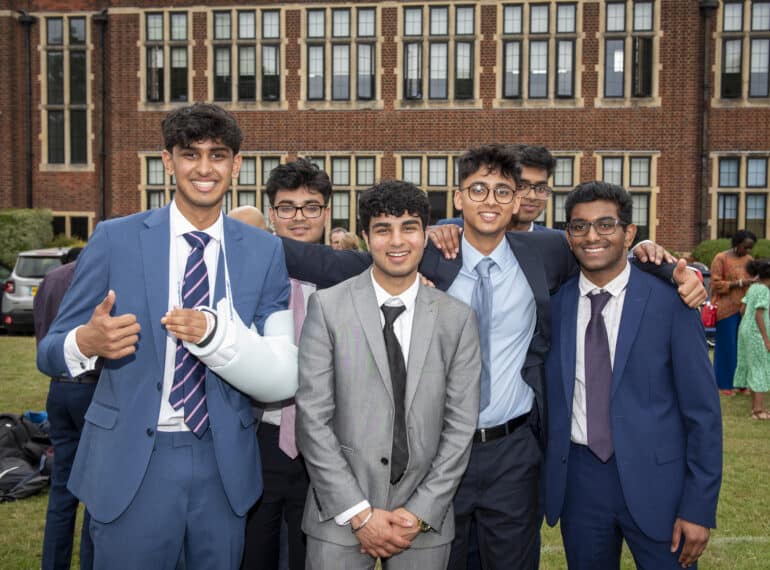
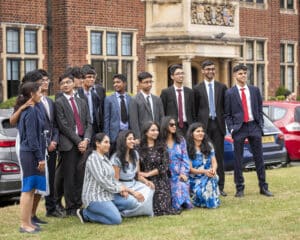 There were prizes for some, while the contribution of all the leavers – or graduands – was celebrated during an occasion in Shearly Hall that featured speeches and presentations, followed by afternoon tea on Staplyton Field.
There were prizes for some, while the contribution of all the leavers – or graduands – was celebrated during an occasion in Shearly Hall that featured speeches and presentations, followed by afternoon tea on Staplyton Field.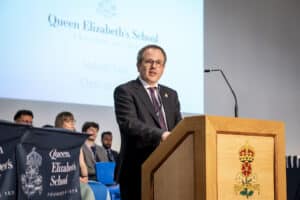 Headmaster Neil Enright thanked parents for their “huge support, both moral and financial, over the years” and urged both them and their sons to stay in touch with the School.
Headmaster Neil Enright thanked parents for their “huge support, both moral and financial, over the years” and urged both them and their sons to stay in touch with the School.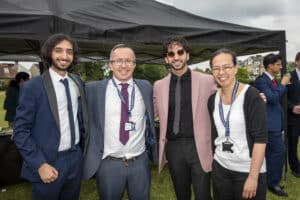 Sahil attended Valediction together with his mother, cousin, friends and his brother, Nikhil Handa (OE 2013–2020). He recalled his first encounter with Deputy Head (Pastoral) David Ryan, who hauled him over the coals after spotting him dancing outside the classroom window to entertain his classmates during afternoon form time. This less-than-auspicious beginning soon turned into a supportive relationship, however, when he became part of Mr Ryan’s English class. “I thought he’d make my life miserable. But to my surprise, it seemed as though he’d forgotten the whole episode entirely. I went on to learn everything from him… Mr Ryan was also the first person who complimented me for being a generalist.”
Sahil attended Valediction together with his mother, cousin, friends and his brother, Nikhil Handa (OE 2013–2020). He recalled his first encounter with Deputy Head (Pastoral) David Ryan, who hauled him over the coals after spotting him dancing outside the classroom window to entertain his classmates during afternoon form time. This less-than-auspicious beginning soon turned into a supportive relationship, however, when he became part of Mr Ryan’s English class. “I thought he’d make my life miserable. But to my surprise, it seemed as though he’d forgotten the whole episode entirely. I went on to learn everything from him… Mr Ryan was also the first person who complimented me for being a generalist.”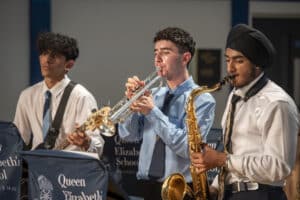 A large majority of Year 13 students attended. All received a set of QE cufflinks, while the prizewinners also received a copy of former Headmaster Dr John Marincowitz’s new history of the School, Queen Elizabeth’s School: 1573–2023. Among the speakers was Theo Mama-Kahn, School Captain 2022, who was one of the leavers. He gave a vote of thanks.
A large majority of Year 13 students attended. All received a set of QE cufflinks, while the prizewinners also received a copy of former Headmaster Dr John Marincowitz’s new history of the School, Queen Elizabeth’s School: 1573–2023. Among the speakers was Theo Mama-Kahn, School Captain 2022, who was one of the leavers. He gave a vote of thanks.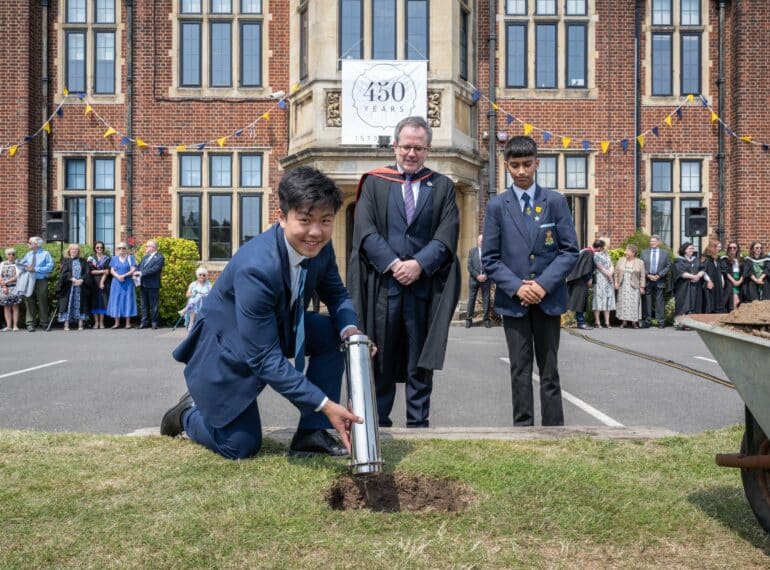
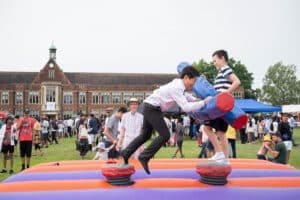 Always a highlight of the School calendar, Founder’s Day this year featured a string of anniversary-related special events, including the burial of a time capsule, as well as time-honoured traditions, from the reading of the School Chronicle to a cricket match between the current School XI and alumni.
Always a highlight of the School calendar, Founder’s Day this year featured a string of anniversary-related special events, including the burial of a time capsule, as well as time-honoured traditions, from the reading of the School Chronicle to a cricket match between the current School XI and alumni.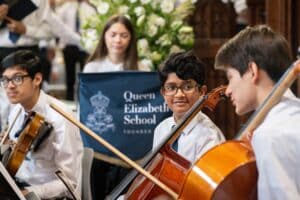 Headmaster Neil Enright said: “Our anniversary slogan is ‘thriving from ancient roots’ – and Founder’s Day 2023 exemplified this to the full. In the morning we reflected together on our long and rich history in the thanksgiving service at the parish church, while the happy crowds at our colourful afternoon fete were a reminder of just how vibrant and successful is the Elizabethan community of today.
Headmaster Neil Enright said: “Our anniversary slogan is ‘thriving from ancient roots’ – and Founder’s Day 2023 exemplified this to the full. In the morning we reflected together on our long and rich history in the thanksgiving service at the parish church, while the happy crowds at our colourful afternoon fete were a reminder of just how vibrant and successful is the Elizabethan community of today.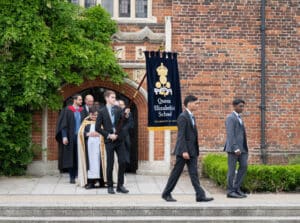 “My thanks go to the small army of people – including FQE volunteers, staff and pupils – who made the day such a success, and to the many who contributed so generously to maximising FQE’s income, which will be invested in the School.
“My thanks go to the small army of people – including FQE volunteers, staff and pupils – who made the day such a success, and to the many who contributed so generously to maximising FQE’s income, which will be invested in the School.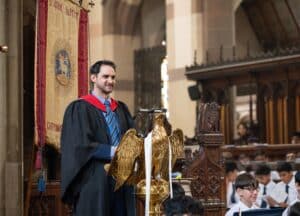 There, Giles Martin (OE 1992–1999) the son of the Chairman of Governors and the Programme Leader for Higher Education Practice at Bath Spa University’s School of Education, reminded the boys and wider congregation of the words of Gandhi: “Live as if you were to die tomorrow. Learn as it you were to live forever.”
There, Giles Martin (OE 1992–1999) the son of the Chairman of Governors and the Programme Leader for Higher Education Practice at Bath Spa University’s School of Education, reminded the boys and wider congregation of the words of Gandhi: “Live as if you were to die tomorrow. Learn as it you were to live forever.”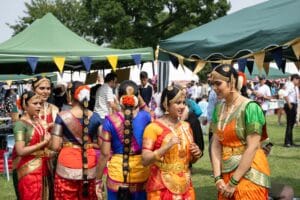 School Captain Darren Lee, of Year 12, stepped forward to fill the deep hole dug for the time capsule. This included:
School Captain Darren Lee, of Year 12, stepped forward to fill the deep hole dug for the time capsule. This included: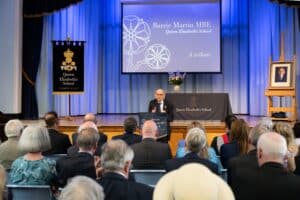 A photographic portrait of Barrie will be placed in the ‘crush hall’ in the Main Building upon his retirement. It was taken by the School’s photographer Eleanor Bentall, who has also taken portraits of subjects including Boris Johnson, former Archbishop of Canterbury Dr Rowan Williams, Clare Balding and Tinie Tempah.
A photographic portrait of Barrie will be placed in the ‘crush hall’ in the Main Building upon his retirement. It was taken by the School’s photographer Eleanor Bentall, who has also taken portraits of subjects including Boris Johnson, former Archbishop of Canterbury Dr Rowan Williams, Clare Balding and Tinie Tempah.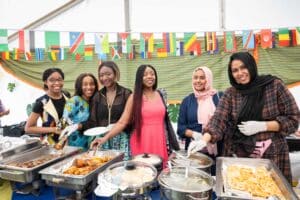 The ever-popular international food tents were extended this year, while there was a range of impressive culinary creations battling it out in the Cake Competition. Additional attractions included a VEX Robotics tent – popular with parents as much as anyone! – and Ju Jitsu, where, rumour has it, Barrie Martin was seen performing a martial arts hold.
The ever-popular international food tents were extended this year, while there was a range of impressive culinary creations battling it out in the Cake Competition. Additional attractions included a VEX Robotics tent – popular with parents as much as anyone! – and Ju Jitsu, where, rumour has it, Barrie Martin was seen performing a martial arts hold. At the back of the School, the Stanley Busby Memorial Cricket Match on Third Field saw the old boys claiming what Head of Cricket Richard Scally described as “a well-deserved victory”. He added: “Both openers for the OEs – Omar Mohamed and Shahil Sheth – scored quickly, amassing 50 runs each and setting a challenging total of 159. In reply, the School lost early wickets and the run rate became too high, and although there was some strong resistance from Year 12’s Rohan Belavadi and Ranvir Sinha, it all proved too little too late, and the old boys won by 39 runs.”
At the back of the School, the Stanley Busby Memorial Cricket Match on Third Field saw the old boys claiming what Head of Cricket Richard Scally described as “a well-deserved victory”. He added: “Both openers for the OEs – Omar Mohamed and Shahil Sheth – scored quickly, amassing 50 runs each and setting a challenging total of 159. In reply, the School lost early wickets and the run rate became too high, and although there was some strong resistance from Year 12’s Rohan Belavadi and Ranvir Sinha, it all proved too little too late, and the old boys won by 39 runs.”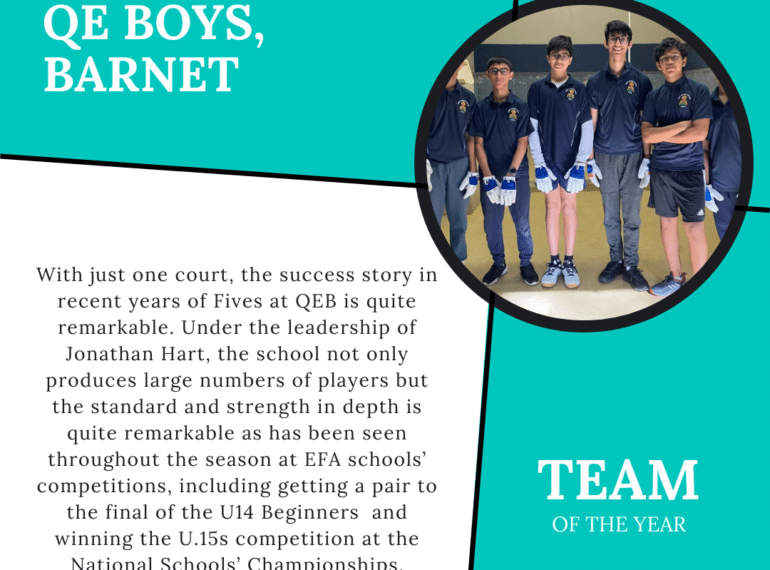
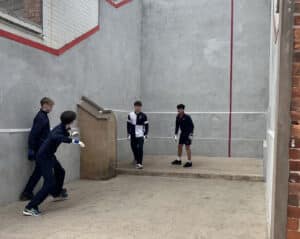 Having last year won the Eton Fives Association’s U14 Beginners’ competition, the Year 10 QE pair of Yash Kedia and Zayn Phoplankar went one better this season, becoming fully fledged U15 champions after beating Berkhamsted School’s best in the National Schools’ Championship. It is thought to be the first-ever national championship title for a QE Fives pairing.
Having last year won the Eton Fives Association’s U14 Beginners’ competition, the Year 10 QE pair of Yash Kedia and Zayn Phoplankar went one better this season, becoming fully fledged U15 champions after beating Berkhamsted School’s best in the National Schools’ Championship. It is thought to be the first-ever national championship title for a QE Fives pairing.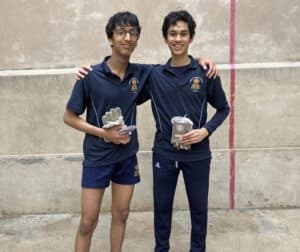 QE’s association with the sport goes back more than 140 years. Its first Fives courts at QE were opened at the School’s previous Wood Street premises in 1880, following a £10 grant from the Governors and a special fund-raising concert.
QE’s association with the sport goes back more than 140 years. Its first Fives courts at QE were opened at the School’s previous Wood Street premises in 1880, following a £10 grant from the Governors and a special fund-raising concert.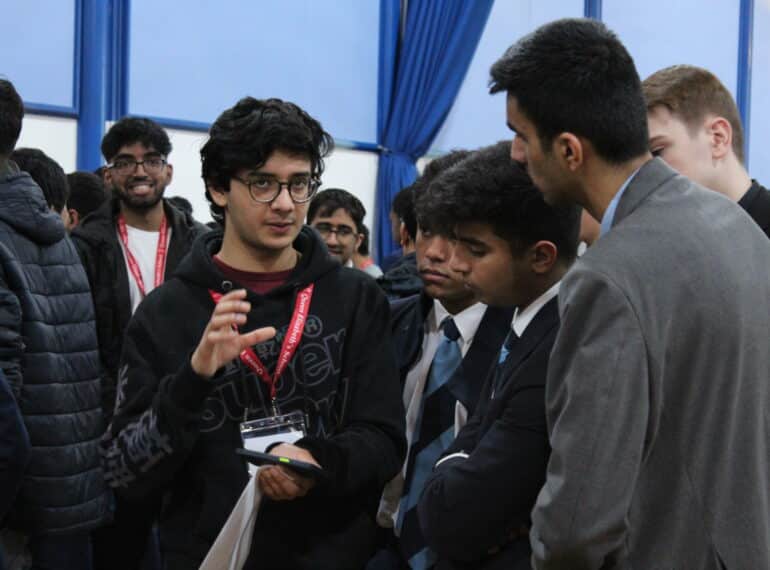
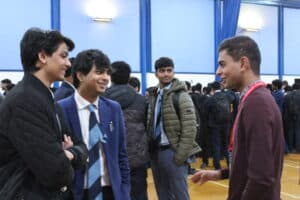 Organised as part of the QE’s extensive programme to support boys preparing for the next stage in their education, the morning event aims to provide detailed and specific guidance to the current Year 12.
Organised as part of the QE’s extensive programme to support boys preparing for the next stage in their education, the morning event aims to provide detailed and specific guidance to the current Year 12.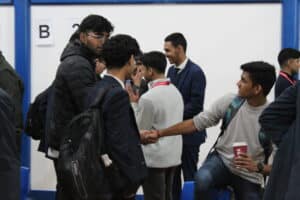 “It is so valuable for our current students to get first-hand information – the inside track – from those studying on courses and at destinations they are considering, helping them very much with the choices that they will be making later in the year,” said Mr Enright.
“It is so valuable for our current students to get first-hand information – the inside track – from those studying on courses and at destinations they are considering, helping them very much with the choices that they will be making later in the year,” said Mr Enright.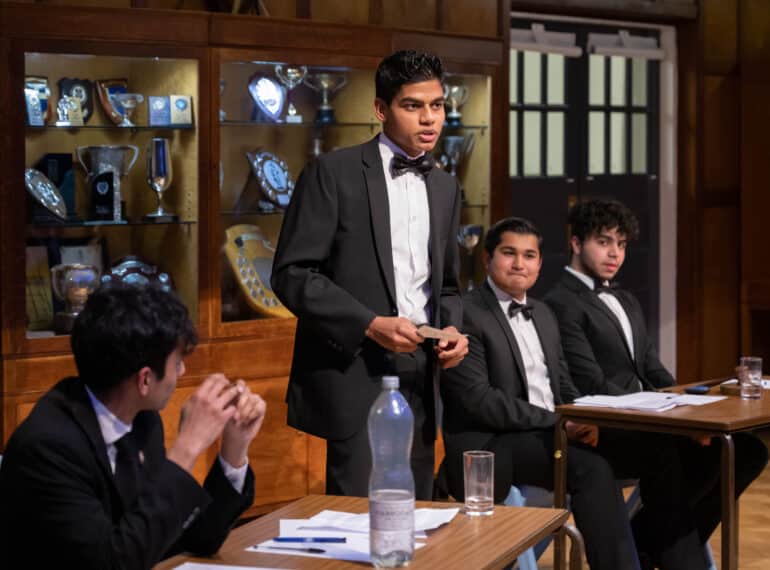
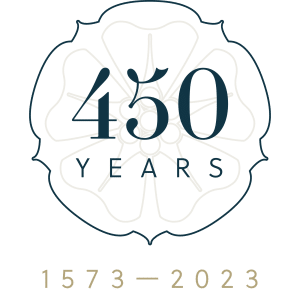 Sixth-formers gathered to take on the visiting Old Elizabethans, debating the motion, This House would leave the past behind us.
Sixth-formers gathered to take on the visiting Old Elizabethans, debating the motion, This House would leave the past behind us.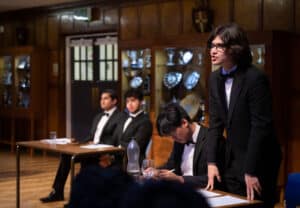 “The dinner participants also made a little bit of history themselves: our 2022 School, Captain Theo Mama-Kahn, led the loyal toast to ‘The King’, rather than ‘The Queen’, for the first time in the Dinner Debate’s history.”
“The dinner participants also made a little bit of history themselves: our 2022 School, Captain Theo Mama-Kahn, led the loyal toast to ‘The King’, rather than ‘The Queen’, for the first time in the Dinner Debate’s history.”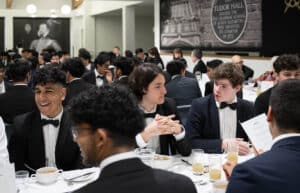 The motion was proposed by the Year 13 pair of Ashwin Sridhar and Sudhamshu Gummadavelly. Opposing it with Saifullah was Mipham Samten (OE 2012–2019). Many Year 13s contributed from the floor.
The motion was proposed by the Year 13 pair of Ashwin Sridhar and Sudhamshu Gummadavelly. Opposing it with Saifullah was Mipham Samten (OE 2012–2019). Many Year 13s contributed from the floor.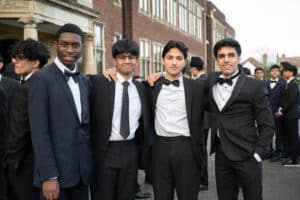 However, at the end of the debate, the proposers’ case had won many over, and the final totals were: 76 for; 55 against; and 39 abstentions. Thus, it was a victory for the School, the Upper Sixth pair successfully convincing people that the past could be left behind, even while its lessons were still being learned.
However, at the end of the debate, the proposers’ case had won many over, and the final totals were: 76 for; 55 against; and 39 abstentions. Thus, it was a victory for the School, the Upper Sixth pair successfully convincing people that the past could be left behind, even while its lessons were still being learned.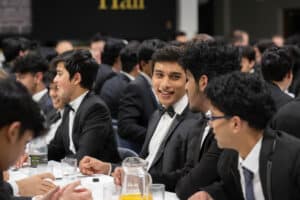 The experience heralded an era of competition success for Saifullah: he has now a record ten mooting and mock trial competitions, and has been a student speaker in six Cambridge Union Debates, the most in recent history.
The experience heralded an era of competition success for Saifullah: he has now a record ten mooting and mock trial competitions, and has been a student speaker in six Cambridge Union Debates, the most in recent history.